REHACARE Newsletter
Social Media

Skin-integrated VR device shows great potential for prostheses control
25/11/2019
A research team of scientists and engineers from City University of Hong Kong (CityU) and Northwestern University in the United States has developed a skin-integrated virtual reality (VR) system, which can be controlled and powered wirelessly. The innovation has great application potential in communications, prosthetic control and rehabilitation, as well as gaming and entertainment.
European digital inclusion strategies
13/11/2019
The 2nd M-Enabling Forum Europe took place on September 19, 2019 at the Congress Center of Messe Düsseldorf during REHACARE. The conference demonstrated the importance of promoting digital inclusion and accessible and assistive technology for persons with disabilities and senior citizens.
Teens with autism can master daily living skills when using video-prompting
08/11/2019
As adults, individuals with autism spectrum disorder (ASD) can be highly dependent on family members or assistance programs for their day-to-day living needs. Research has shown that people with ASD are strong visual learners. With technological advances, devices such as smart phones and tablets have become more portable and ultimately, accessible to caregivers.
November 2019: Quo vadis inclusion?
07/11/2019
Ten years ago, the UN Convention on the Rights of Persons with Disabilities came into force in Germany. There is still considerable criticism of the current state of its implementation. The hope for a more inclusive society has not yet been fulfilled. But what about the rest of Europe? REHACARE.com has set out on a search – for positive developments, but also for obstacles still to be overcome.
Europe: Inclusion with the help of assistive devices
07/11/2019
The supply of auxiliary means differs from country to country – within Europe and worldwide. This can lead to problems for the individuals who live with a disability and depend on their assistive aids in order to be mobile and participate in professional and social life. So what exactly is the situation like and what needs to be improved? REHACARE.com investigated.
Sign language translator app to bridge the gap between deaf and hearing
28/10/2019
Kaunas University of Technology (KTU), Lithuania students created a mobile app that allows translating sign language characters. The app is also an alternative way of text typing.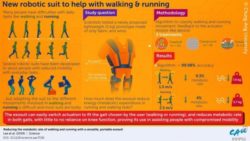
Lightweight, portable robotic suit to increase running and walking performance
23/10/2019
While walking may not seem like a burden for most people, for others, this simple task can often feel exhausting. For patients recovering from surgery or stroke, those with Parkinson's Disease, those with restricted mobility walking or running can be a struggle. Many researchers have pondered over this problem over the years, developing a number of external devices.
Adaptive eating utensils with a Twist: How Bravo Twist by ProWalk outsmarts Parkinson’s tremors
17/10/2019
We all know that food intake is essential for the survival of every living organism. Yet for humans, food can also be a great source of pleasure or even love. At any rate, it is an important part of our social life. But what happens if our own body throws a monkey wrench into our food intake by having a stroke or neurological disorder?
October 2019: Research & development
01/10/2019
Basic research, technology development, and the development of a prototype to a marketable product - these are the steps that innovations go through before we can use them. REHACARE.de has looked around which promising tools could soon conquer the market for blind people and how a FabLab project tries to implement digital participation for all.
The basis for innovation: research and development
01/10/2019
Basic research, technology development, and the development of a prototype to a marketable product - these are the steps that innovations go through before we can use them. REHACARE.de has looked around which promising tools could soon conquer the market for blind people and how a FabLab project tries to implement digital participation for all.
Leveraging research and development to shape the future
01/10/2019
Whether it’s wheelchairs or prosthetics – there is an ongoing effort to continuously improve auxiliary aids and services. As a result, the standards of medical equipment also continue to change - always based on the latest developments and research results. That’s why REHACARE.com has taken a closer look at how trends like digitization and creative minds impact this industry sector.
FabLabs: Learning digital competence and promoting participation
01/10/2019
People with disabilities often need custom-made or adapted items because disabilities are unique to each person. And sometimes the affected person is the only one who comes up with great ideas that are truly helpful in daily life. But not everyone has the knowledge or equipment to create their very own auxiliary aid. This is where so-called fab labs come into play.
September 2019: Highlights at REHACARE 2019
02/09/2019
The time has come again: In September, the exhibition halls in Düsseldorf will be transformed into a market of possibilities. Because REHACARE 2019 is just around the corner. 740 exhibitors from 43 countries are offering a wide range of products for rehabilitation, care and self-determined living. In our current Topic of the Month you can find out more about the highlights of REHACARE 2019.
Highlights at REHACARE 2019
02/09/2019
The time has come again: In September, the exhibition halls in Düsseldorf will be transformed into a market of possibilities. Because REHACARE 2019 is just around the corner. 740 exhibitors from 43 countries are offering a wide range of products for rehabilitation, care and self-determined living. In our current Topic of the Month you can find out more about the highlights of REHACARE 2019.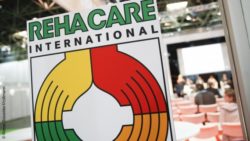
REHACARE 2019: everyone comes together at the market of endless opportunities
02/09/2019
Whether you are a professional, family member or a person with a disability – there’s something for everyone at REHACARE, the leading trade fair for rehabilitation, prevention, inclusion and care. Set to take place September 18 – 21, 2019, the doors of the exhibition halls in Düsseldorf will once again open to welcome anyone interested in auxiliary aids, innovations and expert information.
"Assistive devices help to actively join the meal"
22/08/2019
There are various different kinds of auxiliary means at REHACARE. And the drinking and eating aids are definitely among the popular ones. With its assistive devices the company Assistive Innovations bv from the Netherlands wants to help people with different disabilities to become more independent with eating. CEO Arthur Blom tells REHACARE.com more about classic and new products.
August 2019: Auxiliary means for everyday working life
01/08/2019
A job is the basic prerequisite for a regular income and thus for a self-determined life and participation. People with a disability often need specific auxiliary aids to participate in everyday work life. How those already help to make everyday working life easier today and in the future and why inclusive approaches are important in the area of software, we explain in our Topic of the Month.
WorkHopper: where sitting is a pleasure
01/08/2019
How often do we change our sitting position throughout the workday? People who don’t use wheelchairs can "stretch their legs" during a long day at the office. Unfortunately, that’s not a real option for wheelchair users. That's why the Dutch manufacturer O4 Wheelchairs has created the WorkHopper, a dynamic and ergonomic solution that’s specifically designed for the workplace.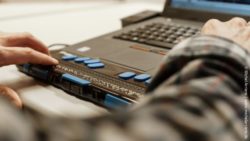
Creating an accessible workplace: inclusive software for people with and without disabilities
01/08/2019
Optimized technical workflows that efficiently accommodate blind, visually impaired and sighted people – the inclusive software by Dräger & Lienert GbR makes it reality. In this REHACARE.com interview, Hansjörg Lienert explains how a small company in Marburg has managed to succeed in international markets and reveals why entrepreneurs sometimes have to take risks to thrive.
Labor force participation: How auxiliary aids can help make the workday easier
01/08/2019
Special tools, accessible software or a modified work environment – there are many ways to create a more accessible workplace for people with disabilities. Options range from conventional analog tools to digital solutions. But how can disability inclusion in the workplace be ensured – today and in the future?
Auxiliary means for everyday working life
01/08/2019
A job is the basic prerequisite for a regular income and thus for a self-determined life and participation. People with a disability often need specific auxiliary aids to participate in everyday work life. How those already help to make everyday working life easier today and in the future and why inclusive approaches are important in the area of software, we explain in our Topic of the Month.
Modifications: Self-determined mobility thanks to accessible VW Bulli Bus
01/07/2019
Whether it’s for their professional life or to travel – many people with disabilities need a car that provides mobility without limits. A small car is often unable to accommodate unique needs. That’s when you need a bigger vehicle – like a minivan.
June 2019: Practical, small and handy: Everyday aids
03/06/2019
In order to be able to live as self-determined as possible in everyday life, an accessible environment is essential. But by far not all everyday objects meet the requirements of people with disabilities. But small helpers can often achieve a lot – whether they are apps or add-ons for existing products or special aids for food intake. Find out more in our Topic of the Month June: Everyday aids.
Practical, small and handy: Everyday aids
03/06/2019
In order to be able to live as self-determined as possible in everyday life, an accessible environment is essential. But by far not all everyday objects meet the requirements of people with disabilities. But small helpers can often achieve a lot – whether they are apps or add-ons for existing products or special aids for food intake. Find out more in our Topic of the Month June: Everyday aids.
"An assistive home and nurse call system provides security and protects privacy"
03/06/2019
Whether you are at home or in a nursing home – you always have to be in a position where you can reliably summon assistance in an emergency by pressing a call button. Yet not everyone is able to easily use the conventional call buttons. That’s why it is important to offer alternatives that provide peace of mind and protection.
Daily living aids improve quality of life
03/06/2019
Whether they are smart and connected or simple and low-tech – the market offers many different types of tools and resources that make everyday tasks easier for people with disabilities. They also increase self-determination and promote participation in all areas of life.
Self-determination thanks to eating and drinking aids
03/06/2019
There are many reasons why a person has trouble eating or drinking, including tremors associated with Parkinson’s disease or neurologic symptoms caused by multiple sclerosis. Eating independently without the need for help is a pervasive need in all of us. It is usually not an issue if we have the right tools.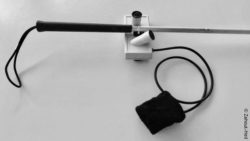
SmAccLab: Smart auxiliary means for everyone
28/05/2019
Accessible and realistic – that’s how auxiliary aids should be in the eyes of Professor Carsten Zahout. Students at the Smart Accessibility Laboratory (SmAccLab) are working on technical solutions that fulfill these requirements and lead to increased participation for people with disabilities. REHACARE.com found out how product engineering and inclusion join forces.
"ichó brings people with and without dementia together and provides a way to share stories, experiences, and impressions."
22/04/2018
Like the golden sphere in the fairy tale of the Frog King, ichó (Greek for echo) is meant to bring back lost motor skills and cognitive functions to people with dementia. The project of four former graduates of the Düsseldorf University of Applied Sciences aims to offer individual support through a person’s favorite music or fairy tale.
"At the TUECHTIG coworking space, people with and without disabilities are working together – and not just next to each other"
22/03/2018
Maximum flexibility to encourage ideas, effectively sharing office space: coworking spaces have become a part of many major cities. In 2017, Berlin featured about one hundred of them, but none of them were comprehensively accessible. That’s something Stefanie Trzecinski from KOPF, HAND + FUSS gGmbH wanted to change. That was the moment, the idea for "TUECHTIG – Raum für Inklusion" was born.
HelpCamps: "Making assistive technology faster, more affordable and personalized"
23/11/2017
In accordance with the slogan "Nothing about us without us", the HelpCamps project aims at developing and implementing concepts and ideas together. To make this a reality, people with disabilities, companies from the assistive technology, care and assistance sectors, as well as stakeholders in the so-called maker movement and researchers, are brought together to network during various events.
"Long cane for children is a 'facilitator'– the chance to independently accomplish something"
17/08/2017
The long cane offers the possibility to be independent and effectively mobile as a person with visual impairment. Children in particular could get used to him in a playful way. The association "Anderes sehen e.V." has co-developed the children's long cane. REHACARE.com spoke to Ellen Schweizer, the founder of the association, about the fact that inclusion is not a burden, but can bring joy.
"Inclusive communication design is both accessible and attractive"
15/06/2017
For many, recognizing and understanding characters is an important prerequisite to social participation. Inclusive communication design helps people with visual impairments to accomplish this. REHACARE.com spoke with designer and expert of the German Association for Blind and Visually Impaired People, Florian Adler. He has developed a digital guide to inclusive communication design.
"Horse riding is a sport people with and without impairments are able to experience together on equal footing"
20/04/2017
More self-confidence and independence – things you can learn from horse riding for example. People with disabilities can take this important step with "Rolli auf Trab" (English: Trotting with Wheelchairs). REHACARE.com spoke with Sandra Glöckler of "Rolli auf Trab" about the lust for life that horse riding inspires and the interaction and experiences with the animals.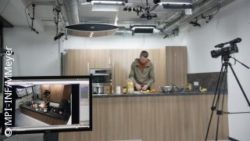
Will software automatically describe movie plots in the near future?
18/07/2016
In order to understand the plot of a movie an audio version is very helpful for visually impaired people. Authors watch the whole movies and describe what happens in each scene. But wouldn’t it be possible for a computer software to do this kind of work? Researchers work on developing a program which automatically generates movie descriptions and reads them out.
Blessing or curse? Using robots in the healthcare sector
21/06/2016
In the distant future? – But today already a reality: robot caregivers are designed to make the daily tasks of healthcare workers easier. Today these types of helpers are already being used in Japan. They lift people in need of care out of their beds, play cards with them or cuddle with dementia patients.
"Ability4Refugees platform wants to provide auxiliary means for refugees with disabilities"
24/05/2016
Many people who had to leave their home country traveled in a wheelchair or used crutches. The stress of this escape was at times even more exhausting and taxing for some than for others. REHACARE.com spoke with Sigrid Arnade (ISL e.V.) and Eva-Maria and Andreas Mohn (Andreas Mohn Foundation) about the Ability4Refugees platform that aims to improve the availability of auxiliary means for refugees.
"The robot facilitates and promotes the connection between children"
15/12/2015
A robot that provides a link between hospital and classroom? The project Avatar Kids makes this possible: acutely ill children are able to actively participate in school activities with the help of a tablet computer. The teacher facilitates the communication. REHACARE.com spoke with Philipp Mahler of Avatar Kids about the opportunities this project provides.
"Safe mobility starts with the right choice and adaptation of the wheelchair"
23/07/2015
Whether it’s a wheelchair or a walker – for people with disabilities, it is crucial to control their own mobility in a competent and safe manner. Yet not everyone truly feels confident in every situation with these assistive devices. That’s why REHACARE.com spoke with Nicole Seifert about ways to foster more trust in yourself and others.